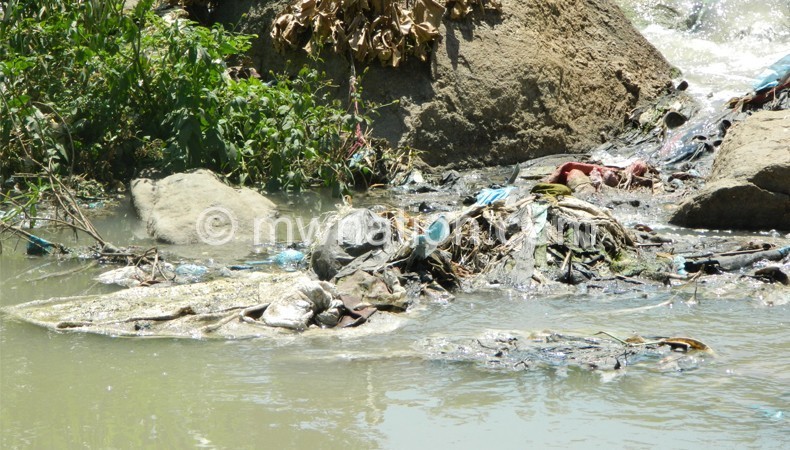Death flows in Mudi river

The heavily polluted Mudi River in Blantyre poses a serious health risk that can see some residents developing deadly diseases such as cancer, an environmental health expert has warned.
Mudi River is among many rivers in the country seriously polluted by industrial activities by manufacturing companies that dump their chemical waste directly into the river.
City residents also hugely contribute to this serious pollution due to the construction of pit latrines along Nasolo River in Blantyre’s populous Ndirande Township, purposely designed to throw faeces into the river.
Blantyre City Council (BBC) has disclosed that a recent mapping survey the council conducted established that 230 toilets were constructed in Ndirande along the banks of Nasolo River.
Nasolo River pours into Mudi River, contributing to the massive pollution of the river and the resultant dreadful stinking that engulfs surrounding areas the river passes through.
From the broken sewer pipes and the toilets constructed along the banks of Nasolo River, said BCC head of department of pollution control Stone Nkhondodwe, faeces drop into the Nasolo and Mudi rivers.
Save Kumwenda, a lecturer in the department of environmental health at the University of Malawi’s Polytechnic, said in an interview that down the stream people use the water for bathing, washing vegetables and other foodstuffs, warning some of the strange diseases people are suffering from could be as a result of that.
Said Kumwenda: “There are some companies that also dump garbage into Mudi River, you are likely to have chemicals in that and that is detrimental to our bodies.
“There is a possibility that some diseases could be a result of this. In worst cases, these chemicals can cause cancer, skin diseases and respiratory and kidney problems.”
The environmental expert said the best solution to the problem is to control the pollution and where vandalism is rampart, to construct concrete bars to protect sewer pipes.
Kumwenda also recommended implementation of Water Policy Act, which he said was passed in Parliament and provides penalties to the offending individuals and companies that damage environment.
The council’s public relations manager Anthony Kasunda said in a response to a questionnaire that pollution of Mudi River is partly due to a vandalised sewer system, resulting in some of the waste going into the river.
Said Kasunda: “As much as there might be some companies that dump waste directly in the river, it will be difficult at the moment to single out such companies until such a time when we fix the sewer system.
“The council has been monitoring developments not only in Mudi River but also other rivers in the city. We are in the process of fixing the sewer system and once that is done, we should be able to pinpoint companies that directly dump their waste in the rivers.”
He said the cleaning of Mudi River is top on the activities to be carried out under the Keep Blantyre City Clean and Green and a budget of K67 million for fixing the sewer system has been put aside.
Nkhondowe pointed out the need to upgrade the entire sewer system constructed in 1970s and 80s when the population of Blantyre City was 200 000 as opposed to today’s 600 000-plus residents.
Some residents in Blantyre use unprotected water sources such as Mudi River as only 45 000 households and institutions are connected to piped water, according to Blantyre Water Board (BWB) public relations officer Pricilla Mateyu.
Mateyu explained that from the 45 000 piped water connections, about K1.5 million people in Blantyre and others from neighbouring districts use the piped water from BWB.
Mateyu said other districts that have access to piped water from BWB are Thyolo up to Thunga, Chikwawa Road up to Milare, Chiradzulu, Lunzu and Matindi.






ewww